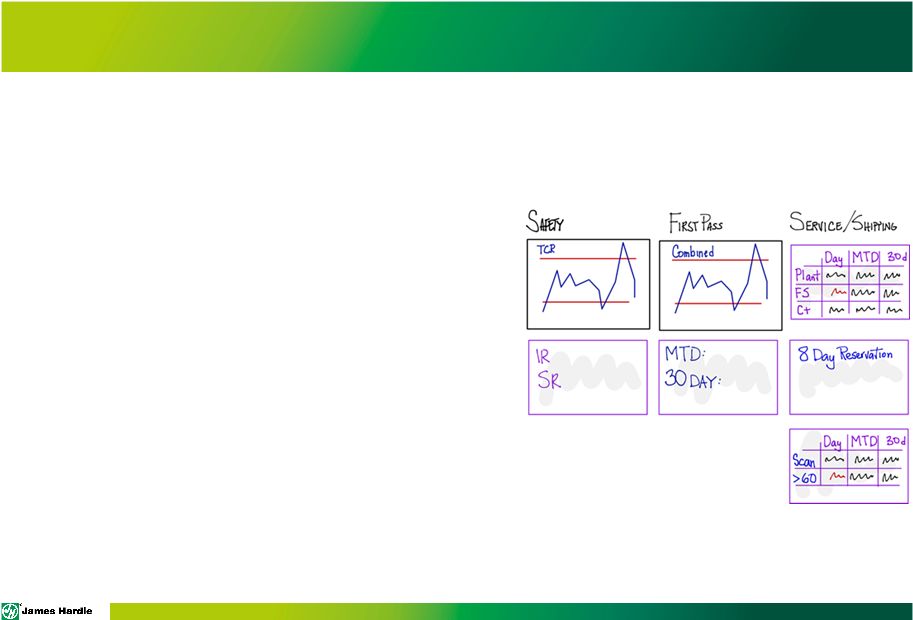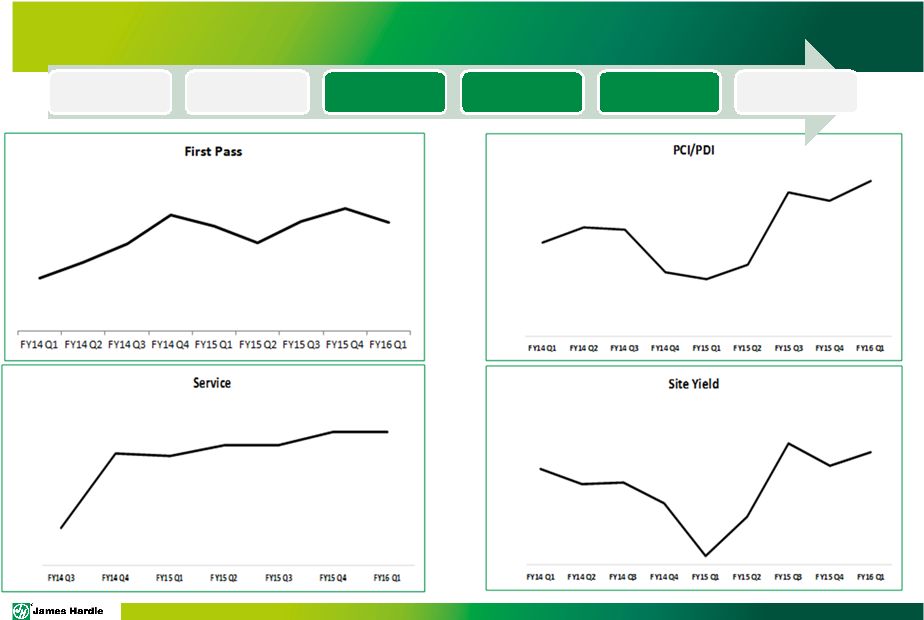 MANUFACTURING EFFICIENCES
September 2015 Exhibit 99.8 |
 MANUFACTURING EFFICIENCES
September 2015 Exhibit 99.8 |
 PAGE DISCLAIMER FORWARD-LOOKING STATEMENTS This Investor Presentation contains forward-looking statements. James Hardie Industries plc (the “company”) may from time to time
make forward-looking statements in its periodic reports filed with or
furnished to the Securities and Exchange Commission, on Forms 20-F and 6-K, in its annual reports to shareholders, in offering circulars, invitation memoranda and prospectuses, in media releases and other written materials and in oral statements made by the company’s officers, directors or employees to
analysts, institutional investors, existing and potential lenders,
representatives of the media and others. Statements that are not historical facts are forward-looking statements and such forward-looking statements are statements made pursuant to the Safe Harbor Provisions of the Private Securities Litigation Reform Act of 1995.
Examples of forward-looking statements include:
• statements about the company’s future performance; • projections of the company’s results of operations or financial condition; • Statements regarding the company’s plans, objectives or goals, including those relating to strategies, initiatives, competition, acquisitions, dispositions and/or its products; • expectations concerning the costs associated with the suspension or closure of operations at any of the company’s plants and future plans
with respect to any such plants; •
expectations concerning the costs associated with the significant capital expenditure projects at any of the company’s plants and future plans with respect to any such projects; • expectations regarding the extension or renewal of the company’s credit facilities including changes to terms, covenants or
ratios; •
expectations concerning dividend payments and share buy-backs;
• statements concerning the company’s corporate and tax domiciles and structures and potential changes to them, including potential tax
charges; •
statements regarding tax liabilities and related audits, reviews and
proceedings; •
expectations about the timing and amount of contributions to Asbestos Injuries
Compensation Fund (AICF), a special purpose fund for the compensation of proven Australian asbestos-related personal injury and death claims; • expectations concerning indemnification obligations; • expectations concerning the adequacy of the company’s warranty provisions and estimates for future warranty-related costs;
• statements regarding the company’s ability to manage legal and regulatory matters (including but not limited to product liability,
environmental, intellectual property and competition law matters) and to
resolve any such pending legal and regulatory matters within current estimates and in anticipation of certain third-party recoveries; and • Statements about economic conditions, such as changes in the US economic or housing recovery or changes in the market conditions in the Asia Pacific region, the levels of new home construction and home renovations, unemployment levels, changes in consumer income, changes or stability in housing values, the availability of mortgages and other financing, mortgage and other interest rates, housing affordability and supply, the levels of foreclosures and home resales, currency exchange rates, and builder and consumer confidence. |
 PAGE DISCLAIMER (continued) Words such as “believe,” “anticipate,” “plan,” “expect,” “intend,” “target,”
“estimate,” “project,” “predict,” “forecast,” “guideline,” “aim,” “will,” “should,” “likely,” “continue,” “may,” “objective,”
“outlook” and similar expressions are intended to identify
forward-looking statements but are not the exclusive means of identifying such statements. Readers are cautioned not to place undue reliance on these forward-looking statements and all such forward-looking statements are qualified in their entirety by reference
to the following cautionary statements. Forward-looking
statements are based on the company’s current expectations, estimates and assumptions and because forward-looking statements address future results, events and conditions, they, by their very nature, involve inherent risks and uncertainties, many of which are unforeseeable and beyond the company’s control. Such known and unknown risks, uncertainties and other factors may cause actual results, performance or other achievements to differ materially from the anticipated results, performance or achievements expressed, projected or implied by these forward-looking statements. These factors, some of which are discussed under “Risk Factors” in Section 3 of the Form 20-F filed with the Securities and Exchange Commission on 21 May 2015, include, but are not limited to: all matters relating to or arising out of the prior manufacture of products that contained asbestos by current and former company subsidiaries; required contributions to AICF, any shortfall in AICF and the effect of currency exchange rate movements on the amount recorded in the company’s financial statements as an asbestos liability; governmental loan facility to AICF; compliance with and changes in tax laws and treatments; competition and product pricing in the markets in which the company operates; the consequences of product failures or defects; exposure to environmental, asbestos, putative consumer class action or other legal proceedings; general economic and market conditions; the supply and cost of raw materials; possible increases in competition and the potential that competitors could copy the company’s products; reliance on a small number of customers; a customer’s inability to pay; compliance with and changes in environmental and health and safety laws; risks of conducting business internationally; compliance with and changes in laws and regulations; the effect of the transfer of the company’s corporate domicile from the Netherlands to Ireland, including changes in corporate governance and any potential tax benefits related thereto; currency exchange risks; dependence on customer preference and the concentration of the company’s customer base on large format retail customers, distributors and dealers; dependence on residential and commercial construction markets; the effect of adverse changes in climate or weather patterns; possible inability to renew credit facilities on terms favorable to the company, or at all; acquisition or sale of businesses and business segments; changes in the company’s key management personnel; inherent limitations on internal controls; use of accounting estimates; and all other risks identified in the company’s reports filed with Australian, Irish and US securities regulatory agencies and exchanges (as appropriate). The company cautions you that the foregoing list of factors is not exhaustive and that other risks and uncertainties may cause actual results to differ materially from those referenced in the company’s forward-looking statements. Forward-looking statements speak only as of the date they are made and are statements of the company’s current expectations concerning future results, events and conditions. The company assumes no obligation to update any forward-looking statements or information except as required by law. |
 PAGE MANUFACTURING STRATEGY • Provides a safe environment and good workplace for all employees, and complies with environmental regulations • Enables JH’s Product Leadership • Ensures capacity is available during periods of peak demand • Allows delivered unit cash costs to remain relatively flat during periods of lower utilization 4 |
 PAGE HOW WE OPERATE Systematic gate approach Safety People Quality Service Process Optimization Cost 5 |
 PAGE MANUFACTURING OPTIMIZATION Eliminating stops and unplanned downtime • Planned stops / planned work • Correcting issues faster • Understanding process control Not to restrict sheet machines at design • Reliable machines • Re-design of work • Elimination of non-value-added work • Statistical Process Control • Root Cause Analysis • Some LEAN Principles • Root Cause Analysis 6 Pre-Autoclave Post-Autoclave James Hardie’s Management System Operators operate, managers manage and engineers support / enable Continuous Process Workstations |
 JAMES
HARDIE’S MANAGEMENT SYSTEM |
 PAGE METRICS • A performance band established for all “gates” in the plant • Basic division of day-to-day responsibilities: – General Foremen: Explains any variations outside the band and formulating a plan of attack to prevent recurrence – Managers: Formulate the strategy to shift or shrink the band 8 |
 PAGE REVIEWING THE METRICS • Management review across all departments: • Daily • Metrics review • Any “out of the band” issues without a clear plan are reviewed later in the day • Weekly • Employee engagement review • Cost review • Band improvement review 9 |
 PAGE SAFETY 2 & 20 Zero Harm 10 Safety People Quality Service Process Optimization Cost Recordable Injuries First Aid Injuries Near Hits Influencers of At-Risk Behaviors • “Brother’s Keeper” Culture • Behavioral focus • Focus on leading indicators |
 PAGE PEOPLE • Operator proficiency in current role • Operator flexibility to manage seasonal demand • Driving down accountability and decision making • Developing capabilities internally and partnering with local schools 11 Safety People Quality Service Process Optimization Cost |
 PAGE US PLANT PERFORMANCE DRIVERS 12 Safety People Quality Service Process Optimization Cost |
 PAGE QUESTIONS 13 |